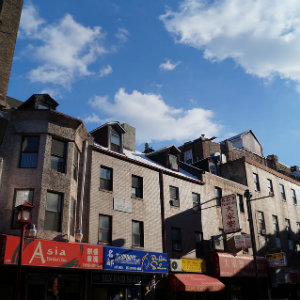Has your child recently tested positive for lead poisoning? You may be desperate to find a solution. Are you wondering:
- Is my landlord responsible for fixing this problem?
- How am I going to afford my child's medical bills?
- Will my child ever recover from this damage?
- How will I ever afford a lawyer?
There is no excuse for preventable lead poisoning. Our lawyers are prepared to fight for your justice.
I will hold your negligent landlord liable for a failure to protect your children from lead poisoning.
Is there anything more tragic than a young child's potential cut short? Every day, innocent children acquire permanent neurological injuries as a result of lead poisoning. In Philadelphia, this problem has turned into a full-fledged epidemic.
It's been nearly 40 years since lead paint was nationally banned, but the problem has not gone away. Philadelphia residents are particularly vulnerable to this crisis, as a whopping 92% of Philadelphia homes were built before the 1978 lead paint ban. These families deserve answers.
Philly's Lead Poison Crisis
Over the past couple of years, national attention has been drawn to the lead-polluted water crisis in Flint, Michigan. But very few national news outlets have made any mention of the equally devastating circumstances surrounding lead poisoning in Philadelphia. According to the Philadelphia Inquirer, in 2015 there were 2,700 Philadelphia children who tested positive for lead in their blood - roughly twice the national average.
The prevalence of old houses makes Philly homes particularly high-risk. Poorer neighborhoods are disproportionately affected, as they have a higher concentration of older homes and residents are less capable of relocating because of financial limitations. In some of these neighborhoods, as many as one in five children under age 6 have tested for high lead levels.
FREE PERSONAL INJURY CONSULTATION
Lead Paint Disclosure and Certification Law
In December of 2012, Philadelphia passed the Lead Paint Disclosure and Certification Law. This law requires landlords to ensure that their rental properties are free of toxic lead levels if the tenants have a children age 6 and younger. More than half of the children exposed to lead paint or dust are living in rental properties.
When renting a house built before 1978 to new tenants with young children, landlords are required to:
- Certify that the property is lead-safe or lead-free
- Provide the tenant with a copy of a lead-safe or lead-free certificate, along with other required information
- Provide the Department of Public health with a copy of the same certificate, signed by the tenant
During an inspection, the landlord if required to meet the following criteria:
- Look for chipping, peeling, or defective paint
- Taking dust wipes for analysis of lead-based paint dust
- Inspection required once every two years, as long as a child under 6 lives there
- Landlord must fix any chipping, peeling, or defective paint reported by the tenant
- Failure to meet these standards could result in landlord certification being revoked.
While this may seem like a step in the right direction, the application has been a disaster. The vast majority of landlords simply ignore this law and almost never suffer any consequences.
According to the previously mentioned Philadelphia Inquirer report, the city only brings the most serious cases into court - a total of 121 cases in 2015. The city only gets involved when a child tests at level 10 or higher, when it's far too late. Even small levels of lead poisoning can cause irreversible damage.
Consequences Of Exposure
Children who are exposed to lead poisoning may suffer from the following ailments:
- Slowed physical growth
- Hearing and speech impairments
- Behavioral problems
- Learning disorders
- Cognitive impairments
These problems are irreversible and can limit a child's potential to succeed socially, academically, and professionally. The callous negligence some landlords show for this problem is enough to make your blood boil.
Landlords who are aware of lead paint and choose not to address it deserve it to be held accountable for their heartless disregard for innocent children. Our lawyers are determined to make them pay for the damages they've caused.
How Are Children Exposed?
Children are naturally curious, and their naive innocence often blinds them to possible dangers. No young child is capable of understanding the dangers of ingested lead paint or dust. They may ingest it in a number of ways:
- Breathing in lead-based dust in the air
- Crawling on the floor
- Putting hands, toys, and other objects in their mouths
- Eating pieces of chipped or peeling paint (this often has a sweet taste, which is attractive to kids)
Even the most watchful parent will struggle to prevent their child from consuming lead when it's present in the home. There is no excuse for a negligent landlord allowing these dangerous conditions to persist, especially when there are young children in the home.
Do I Have A Lawsuit?
If your child has recently tested positive for high levels of lead poisoning and you've been dealing with a difficult landlord, there may be hope. The effects of lead poisoning may be permanent, but your family and your child require extensive resources in order to fight through this lifelong struggle. Our experienced personal injury lawyers can help hold negligent landlords responsible for damages caused by lead poisoning.
Seeking immediate medical care is clearly the first step in this situation. But it's almost equally important to seek out a lawyer to guide you through this process. This is especially true in Philadelphia, where city officials are happy to turn a blind eye to a landlord's refusal to follow the Lead Paint Disclosure and Certification Law.
If you're worried about costs, don't fret. Our lawyers offer free consultations and work on a contingency fee basis - that means you pay us nothing until we win. In a personal injury case, you may recover damages for:
- Medical expenses
- Past and future lost wages
- Loss of quality of life
- Pain and suffering
- Punitive damages (in cases of cruel negligence)

